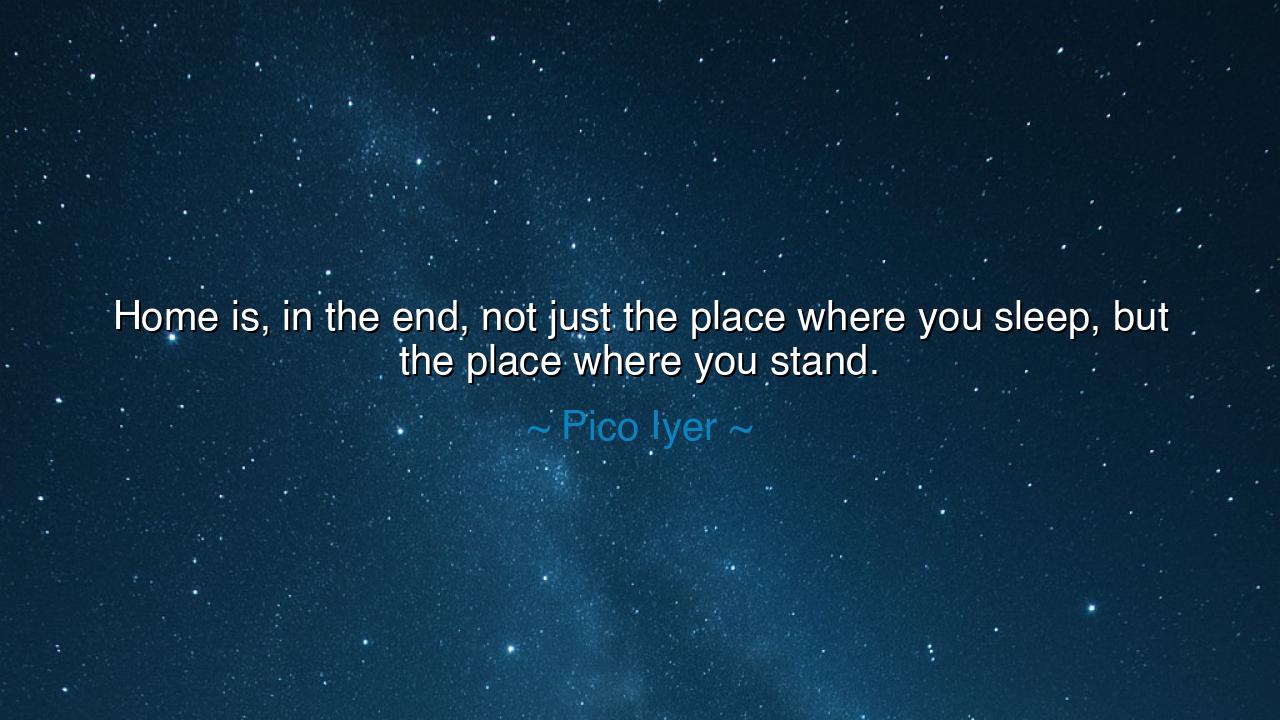
Home is, in the end, not just the place where you sleep, but the
Home is, in the end, not just the place where you sleep, but the place where you stand.






In the profound words of Pico Iyer, the wanderer-philosopher of our age, we find a truth that speaks across centuries and civilizations: “Home is, in the end, not just the place where you sleep, but the place where you stand.” These words rise like a bell tolling softly through the heart, calling us to remember that home is not merely walls and roofs, not merely the address written upon our documents, but the ground of meaning upon which our souls take their stance. It is the place — literal or symbolic — where we declare who we are, where we draw our line of belonging in a world that moves ceaselessly.
Pico Iyer, who has spent much of his life between nations — born in England to Indian parents, raised in California, dwelling in Japan — knows well the longing for belonging that marks the modern spirit. His life is a tapestry woven from many cultures, yet through all his journeys he came to see that home is not found, but made. It is the space where one stands firm in one’s truth, even as the world shifts. Thus, his words are both a meditation and a challenge — to recognize that the true home of a person lies not in geography, but in conviction, not in comfort, but in commitment.
In the ancient world, philosophers, prophets, and poets spoke of this same truth in different tongues. The Stoics taught that the wise man’s home is wherever virtue dwells, for the just man carries his dwelling within him. The Hebrews, in exile from Jerusalem, learned to find their home in faith, not in stone temples. And the Greeks told of Odysseus, whose long voyage taught him that home was not merely Ithaca’s shores, but the hard-won wisdom that lived within him after the storms. So too does Iyer’s insight echo through time: to have a home is to take one’s stand — to root the spirit in purpose when the world offers only movement.
Consider the life of Mahatma Gandhi, who wandered from India to South Africa and back again. Though he owned no land, built no house of permanence, and dressed in the simplest cloth, he was more at home in himself than many kings in their palaces. Wherever he stood — whether in a prison cell or at the edge of the sea — he stood for truth, for peace, for human dignity. His home was not a place, but a principle. In that steadfastness of soul, he embodied exactly what Iyer’s words proclaim: that home is where one stands, and that the heart anchored in truth cannot be uprooted by exile or loss.
In this light, “the place where you stand” becomes more than metaphor — it is the moral ground of being. The modern soul, drifting amid cities and screens, often confuses comfort with belonging. We decorate houses but neglect foundations; we travel endlessly, yet feel homeless within. Iyer reminds us that to stand somewhere — in values, in gratitude, in compassion — is to find home again. The weary heart does not need to return to its birthplace to rest; it need only reclaim its integrity, and say, “Here, in this moment, I belong.”
There is also a deeper call in these words — a call to responsibility. For to “stand” somewhere is not only to find peace, but to take a position in the world. Home is not a retreat from life’s struggles, but a platform from which one acts. It is where we plant our convictions like seeds, so that others may find shade beneath their branches. The warrior who stands for justice, the teacher who stands for truth, the parent who stands for love — each builds a home that no storm can destroy. For homes built on virtue are stronger than those made of stone, and they endure even after the body has gone.
The lesson, then, is this: Home is not a matter of location, but of alignment. It is where your outer life meets your inner truth. To those who wander, do not despair — the world may be vast, but the soul’s compass always points toward its rightful ground. Wherever you choose to live, live deliberately; wherever you travel, carry your values with you as your dwelling. Stand where your heart tells you to stand — for that is your home, and from that home, your life will draw its strength.
Thus, Pico Iyer’s words remind us that in a restless age, we need not fear our rootlessness. The one who stands firmly in purpose, in love, in truth — that one is never homeless. For home is not merely the place you return to at night, but the sacred ground where you take your stand each morning — the meeting point between who you are, what you believe, and how you live. And when you have found that place within yourself, then no matter where you go, you will always be home.






AAdministratorAdministrator
Welcome, honored guests. Please leave a comment, we will respond soon